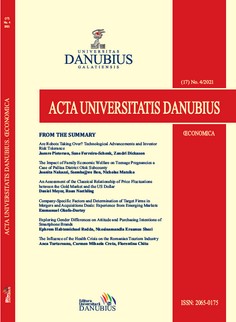Financial Inclusion as an Intentional Behaviour in Zimbabwe
Financial Inclusion as an Intentional Behaviour in Zimbabwe
Author(s): Alexander Maune, Ephraim Matanda, Justice MundondeSubject(s): Business Economy / Management, Behaviorism, Social Norms / Social Control, Socio-Economic Research
Published by: Editura Universitară Danubius
Keywords: Financial inclusion; Planned behaviour; PLS-SEM; Behavioural Intention; Use behaviour;
Summary/Abstract: Purpose – This article examined financial inclusion as a planned behaviour using partial least squares structural equation modeling (PLS-SEM) algorithm in Smart PLS 3 software. Attention was given to perspective antecedents in behavioural intention and use behaviour of financial services/products. Approach – To understand this phenomenon, primary data collected through an online survey were used to empirically test the extended theory of the planned behaviour model. We applied the partial least squares structural equation modeling (PLS-SEM) algorithm using Smart PLS 3software to analyse relationships between latent and observed variables. Respondents were drawn from academics, banking and non-banking participants in Zimbabwe. Findings – Our results show that an extended TPB model holds for financial inclusion. The results also show an acceptable model fit with predictive relevance of endogenous constructs as assessed by R2, Q2, the significance of paths and standardized root mean square residual (SRMR). Our findings also confirmed hypothesis H1a, H1b, H6,and H7 while the rest were rejected as they were insignificant. Practical implications – Financial services product developers, policymakers, financial inclusion practitioners, and regulators will have a better understanding of financial inclusion behavioural intention and use behaviour based on the findings. Originality/value – Previous research has largely ignored the influence of perceptive antecedents in financial inclusion. This article covers this gap by drawing attention to the cognitive psychological perspective of financial inclusion.
Journal: Acta Universitatis Danubius. Œconomica
- Issue Year: 17/2021
- Issue No: 4
- Page Range: 177-211
- Page Count: 35
- Language: English

